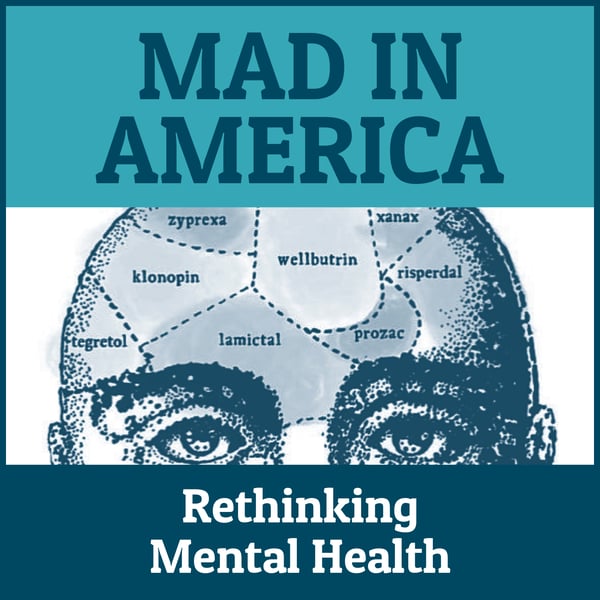Our Medical System Protects Wrongdoers and Punishes Whistleblowers: An Interview with Carl Elliott
Mad in America: Rethinking Mental Health
Mad in America
4.8 • 201 Ratings
🗓️ 7 August 2024
⏱️ 46 minutes
🧾️ Download transcript
Summary
Carl Elliott is a distinguished professor at the University of Minnesota with joint appointments in the Department of Philosophy and the School of Journalism and Mass Communications.
An influential voice in bioethics, Elliott is known for his critical examination of the medical and pharmaceutical industries. His latest book, The Occasional Human Sacrifice: Medical Experimentation and the Price of Saying No,describes the harrowing experiences of whistleblowers who expose corruption and malpractice in clinical trials and psychiatric research.
Originally from South Carolina, Elliott's diverse academic background includes a medical degree and a PhD in philosophy from Glasgow University in Scotland. His extensive postdoctoral work has taken him to institutions such as the University of Chicago, the University of Otago in New Zealand, and the Nelson Mandela School of Medicine in South Africa. Elliott is the author and editor of several influential books, including Better than Well: American Medicine Meets the American Dream and White Coat and Black Hat: Adventures on the Dark Side of Medicine. His articles have been featured in prestigious publications such as The New Yorker, The Atlantic Monthly, Mother Jones, and The New England Journal of Medicine (as well as Mad in America). Elliott's critical work in bioethics has earned him numerous accolades, including the Erikson Prize for Excellence in Mental Health Media and a fellowship at the Safra Center for Ethics at Harvard University.
His investigative work has shed light on numerous scandals, including the tragic case of Dan Markingson, a young man who died during a controversial clinical trial at the University of Minnesota. In this interview, Elliott discusses the systemic issues that protect wrongdoers, the personal and professional toll on those who speak out, and the broader implications for ethics in medical research and practice.
***
Thank you for being with us to listen to the podcast and read our articles this year. MIA is funded entirely by reader donations. If you value MIA, please help us continue to survive and grow.
To find the Mad in America podcast on your preferred podcast player, click here
© Mad in America 2024. Produced by James Moore
Transcript
Click on a timestamp to play from that location
| 0:00.0 | Welcome to the Madden America podcast, your source for science, psychiatry, and social justice. |
| 0:14.8 | Hello everyone and welcome to Mad in America. This is your host for today, Ayurdi Dhar, founder and editor of Mad in South Asia. |
| 0:22.5 | Our guest today is Dr. Carl Elliott. Dr. Elliott is a professor in the Department of Philosophy |
| 0:27.6 | at the University of Minnesota. He has received numerous awards, grants, and fellowships for his |
| 0:32.8 | work in bioethics. His writings have appeared in the Atlantic, the New York Times, among other places, |
| 0:38.8 | and his most recent book, The Occasional Human Sacrifice, Medical Experimentation, and the |
| 0:44.3 | price of saying no, just came out. Dr. Elliott was first trained in medicine and then ventured into |
| 0:50.1 | philosophy for reasons we will soon discuss. But in today's interview, we will talk to him about his own experience with whistleblowing, |
| 0:58.1 | corruption and medicine, especially psychiatry, and discuss some of the most egregious examples |
| 1:03.4 | of wrongdoing in research. |
| 1:05.5 | Dr. Elliot, welcome to Matt in America. |
| 1:07.9 | Thank you. |
| 1:08.9 | Thanks for having me. |
| 1:09.9 | All right, so let's dig in. The first is let's go |
| 1:12.8 | over your new book, The Occasional Human Sacrifice. Can you begin with your story and the details |
| 1:19.7 | of your case and your experience with whistleblowing? That story begins, I guess for me in the summer of |
| 1:27.1 | 2008, which is when I was on sabbatical, |
| 1:30.4 | first in New Zealand, but later in South Africa. And I got a message, an email message from |
| 1:38.8 | a friend of mine, a reporter in the Twin Cities, Paul Tosto, who wanted to know what I made of a series about a death in a clinical trial that he and his colleague, Jeremy Olson, had written for the St. Paul Pioneer Press, which is the St. Paul City newspaper. |
| 2:00.3 | And I read it and it hit very hard. It was a horrible story. The short version of it is that a young man named Dan Markington was brought to our teaching hospital in the throes of a psychotic episode. He was delusional. He was violent. He was |
| 2:22.8 | threatening to commit mass murder. He was threatening to kill his mother, who he was living |
| 2:28.8 | with at the time. And he was seen by the head of the schizophrenia program at the University of Minnesota, |
... |
Please login to see the full transcript.
Disclaimer: The podcast and artwork embedded on this page are from Mad in America, and are the property of its owner and not affiliated with or endorsed by Tapesearch.
Generated transcripts are the property of Mad in America and are distributed freely under the Fair Use doctrine. Transcripts generated by Tapesearch are not guaranteed to be accurate.
Copyright © Tapesearch 2025.

